Unveiling the Leadership Styles of Icons like Elon Musk
Leadership is a quality that is often talked about but rarely understood. It’s a quality that can make or break an organisation, yet it’s hard to define. Well, in this article, we’ll explore the leadership styles of some of the world’s most successful leaders, including Elon Musk, Bill Gates, Jeff Bezos, Tim Cook, Nelson Mandela, and Steve Jobs—each an icon in their own right with a unique approach to leadership that has shaped industries.
We’ll explore the world of leadership and learn from the pros who’ve made a lasting mark on success. But what’s the importance of this you may ask. Well, did you know that only 48% of employees perceive their company’s leadership as ‘high quality’? Imagine the ripple effect this has on the collective journey of an organisation!

#1. Elon Musk: The Visionary Maverick
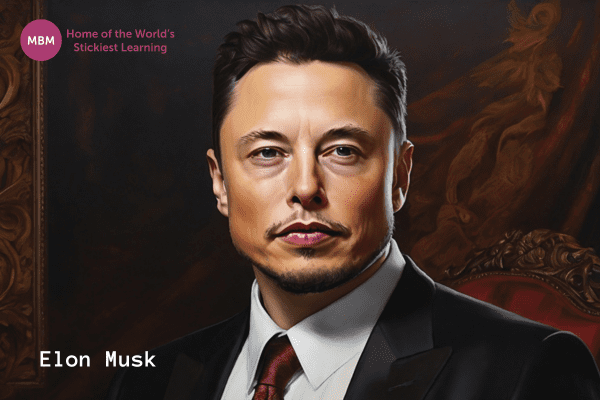
Elon Musk, a famous businessperson and CEO of SpaceX and Tesla, has a unique way of leading that combines innovative and decisive approaches. All in all, Musk’s unusual style shows his role as a forward-thinking leader who is always pushing the limits of innovation.
Elon Musk’s Leadership Style
Elon Musk leads by inspiring and making quick decisions. As a visionary leader, Musk motivates his team to come together for a shared goal, using a hands-on approach to solve problems. Additionally, his unique leadership style includes taking risks and pushing limits, encouraging a culture of always getting better.
Musk also firmly believes in the power of feedback, encouraging his team to reflect on their work and strive for constant enhancement. Capturing the essence of his leadership philosophy, he once stated:
I think it’s essential to have a feedback loop, where you’re constantly thinking about what you’ve done and how you could be doing it better.”
Note that Elon Musk’s leadership style works well for leaders in fast-changing industries where innovation, taking risks, and thinking in transformative ways are crucial. So in adopting Musk’s principles, leaders can also foster a culture of continuous improvement, encouraging risk-taking, and embracing failure as a stepping stone to innovation.
Moreover, this leadership style is particularly effective for leaders aiming to disrupt traditional norms and drive groundbreaking advancements. Furthermore, Musk’s hands-on approach to problem-solving and visionary thinking offers a guide for leaders seeking to navigate challenges, inspire teams, and leave a lasting impact on industries undergoing rapid transformation.
Musk’s Approach to Innovation and Risk-Taking
Elon Musk is a renowned risk-taker, unafraid to make bold decisions. Moreover, his innovative ideas and ability to think outside the box have left an indelible mark on the tech industry.
Musk strongly supports the positive impact of technology, demonstrated through his pioneering companies such as SpaceX, Tesla, and Neuralink. Central to his approach to innovation is his willingness to take risks and push boundaries. Furthermore, Musk embraces failure as an essential part of the learning process, asserting, “Failure is an option here. If things are not failing, you are not innovating enough.”
Sticky Learning ® is 7 times more effective than 1-day training courses. Plus, you will get a Chain of Evidence proving your Return on Investment. Discover soft skills training that changes behaviours long term.

Key Decisions that Reflect His Leadership Style
Musk’s leadership style is evident in key decisions that have defined his career. Notably, his substantial investment in SpaceX, aimed at making space travel more accessible, exemplifies his bold and forward-thinking approach. This decision, considered risky at the time, proved to be a strategic triumph.
Another example of Musk’s leadership style was founding Tesla, a company set to change the automotive industry with electric cars. Also, Musk’s willingness to take such risks and push conventional boundaries underscores his unconventional leadership style, resulting in transformative outcomes for both SpaceX and Tesla.
#2. Bill Gates: Tech Titan and Philanthropic Visionary

Now Bill Gates is a name that needs no introduction. A tech leader who helped start Microsoft, he played a crucial role in transforming the computer industry. Beyond his technological prowess, Gates has equally gained recognition for his charitable endeavours through the Bill & Melinda Gates Foundation, which is dedicated to supporting global health, education, and poverty alleviation initiatives.
Now in this section, we’ll delve into Bill Gates’ leadership evolution, his foundational role at Microsoft, his transformative philanthropic efforts, and extract key leadership lessons from his remarkable journey.
Bill Gates’ Leadership Evolution
Gates’ leadership style has undergone a significant evolution. Initially, he began as an autocratic leader, relying on personal expertise; however, he transitioned into a transformational leader who empowers and inspires innovation within his team.
Evolving from being a task-oriented leader with a focus on goals and objectives, Gates also embodies the shift towards collaborative and empowering leadership. As he aptly puts it, “As we look ahead into the next century, leaders will be those who empower others,” emphasising the crucial role of empowerment in effective leadership.
Bill Gates’ leadership evolution from an autocratic to a transformational style is suitable for industries where innovation is essential. In adopting Gates’ principles, leaders can also empower team members and embrace calculated risks for continuous improvement.
Moreover, this leadership style is well-suited for those aiming to balance technological advancement with a sense of social responsibility. Furthermore, leaders seeking to make a meaningful impact can draw inspiration from Gates’ philanthropic philosophy.
Gates’ Role in Founding Microsoft and Charitable Endeavours
Co-founding Microsoft in 1975, Gates led the company to unprecedented success. However, his contributions extend beyond corporate achievements. Gates started the Bill & Melinda Gates Foundation, directing his money towards worldwide health, education, and reducing poverty.
His philosophy is:
It’s not just about wealth. It’s about using that wealth to give back to society,”
—reflecting a commitment to leveraging resources for societal good. Gates marked his legacy with technological innovation. Also, he demonstrated a profound dedication to making a positive impact on a global scale.
Key Leadership Lessons from Gates
Bill Gates’ leadership journey offers valuable lessons for aspiring leaders.
- Firstly, the importance of empowering others emerges as a cornerstone of effective leadership. Gates recognised that collective efforts yield greater success than individual endeavours.
- Secondly, Gates’ emphasis on innovation and risk-taking underscores the necessity of bold decision-making. Failure, in his view, is an integral part of the learning process, encouraging leaders to take risks and push boundaries.
- Lastly, Gates’ philanthropic dedication imparts the lesson of giving back to society. His life’s work also emphasises the transformative potential of using wealth to address global challenges.
While Elon Musk’s leadership disrupts industries, Gates’ enduring influence continues to shape the tech landscape.
#3. Jeff Bezos: Leading with a Focus on Customers
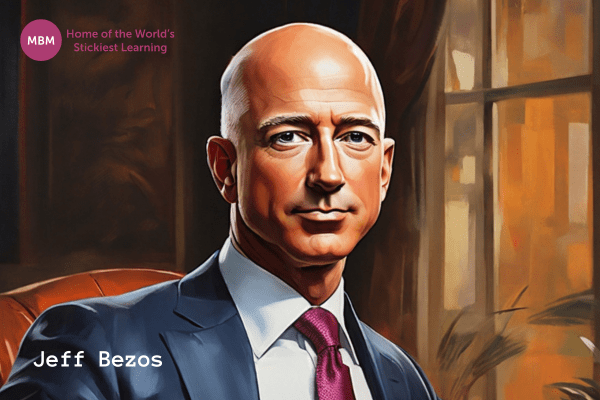
Now Jeff Bezos is a trailblazer in e-commerce. He has left an indelible mark by reshaping the industry through innovative thinking and decisive actions. Now in this exploration, we’ll delve into the essence of Jeff Bezos’ leadership style. Spcifically, we will focus on his customer-centric approach, long-term vision, and strategic decisions, all while distilling valuable lessons for leaders.
Bezos’ Customer-Centric Approach at Amazon
At the core of Bezos’ leadership is a relentless commitment to customer satisfaction, evident in Amazon’s mission to be “Earth’s most customer-centric company.”
Bezos sees customers as guests at a party, and he stresses a strong commitment to consistently improving every part of their experience. This customer-centric philosophy, a driving force behind Amazon’s success, serves as a beacon for businesses across industries. It underscores the critical importance of putting the customer at the forefront of strategic decision-making.
This leadership style suits industries prioritising customer satisfaction and technological disruption. For those fostering a culture of continuous improvement, incorporating Bezos’ principles involves placing the customer at the decision-making centre, fostering a long-term vision, and embracing calculated risks for innovation. It fits dynamic environments where adaptability, resilience, and understanding of evolving customer needs are integral to sustained success.
Bezos’ Long-Term Vision and Strategic Decisions
Bezos, a forward-thinking leader, is not afraid to make daring decisions and pursue innovative changes in industries. Furthermore, his vision has been a crucial factor in Amazon’s extraordinary success story. Backed by data-driven insights and customer feedback, Bezos’ strategic decisions aim to position Amazon as the epitome of customer-centricity globally.
Notably, the quote:
We’re not competitor obsessed; we’re customer obsessed, We start with what the customer needs and work backwards,”
—encapsulates his approach, emphasising the value of customer-focused innovation and strategic thinking. Consequently, for leaders, this signifies the importance of aligning long-term vision with customer needs and continuously iterating strategies based on customer feedback.
Leadership Lessons from Bezos’ Journey
Bezos’ leadership journey imparts practical lessons for leaders seeking success in a dynamic business environment. Chief among these lessons is the pivotal role of being customer-centric.
Recognising customers as the lifeblood of any business is foundational. Bezos’ encouragement of innovation and risk-taking, coupled with an acceptance of failure as part of the learning process, underscores the importance of adaptability and resilience. His long-term vision serves as a guide for leaders, highlighting the necessity of a clear direction and relentless pursuit of goals.
Comparison with Elon Musk Leadership
Elon Musk’s leadership, marked by visionary risk-taking, contrasts with Tim Cook’s operational genius. Musk innovates industries, while Cook excels in precision. As a transformational leader, Bezos demonstrates the power of inspiring teams to unite to achieve common goals through hands-on problem-solving.
#4. Tim Cook: Architect of Operational Excellence at Apple
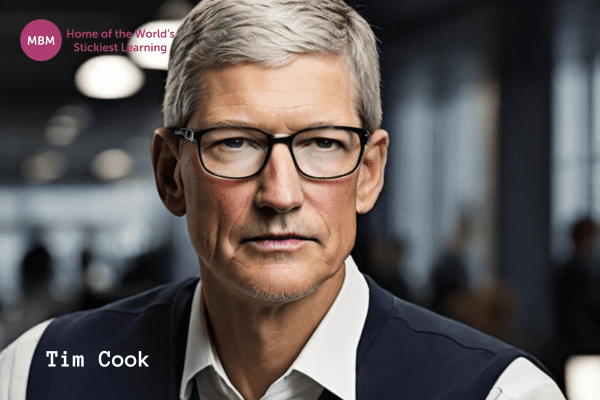
Shaping Collaborative Operations
Tim Cook, widely recognized for his operational expertise, has led a significant transformation of Apple’s operations and supply chain management. Furthermore, Cook’s leadership, characterised by collaboration and inclusivity, has been pivotal in reshaping Apple’s operational landscape.
Additionally, as a servant leader at heart, Cook prioritises the needs of his team, fostering an environment that encourages growth and development. This focus on operational efficiency is evident in his ability to streamline processes, reduce costs, and enhance Apple’s profitability.
A defining quote capturing Cook’s leadership philosophy is:
The most important thing for me as a CEO is that our employees feel that they’re having an impact. Innovation is almost an infectious thing. It spreads throughout the company.”
Sustainable Stewardship: Navigating the Green Frontier
Cook’s leadership extends beyond operational efficiency into the intricate realm of supply chain management and sustainability. Moreover, recognising the environmental impact of Apple’s operations, he has championed initiatives to enhance supply chain management and reduce the company’s carbon footprint.
Additionally, Cook’s commitment to sustainability is reflected in his advocacy for renewable energy sources and the use of recycled materials in Apple’s manufacturing processes. Furthermore, his vision extends to making Apple a carbon-neutral company by 2030, aligning corporate success with a profound sense of social and environmental responsibility. The quote, “We have a moral responsibility to leave the planet better than we found it,” encapsulates Cook’s dedication to a sustainable future.
Leadership Insights: Navigating Complex Business Landscapes
Tim Cook’s leadership style, marked by collaboration, inclusivity, and a focus on sustainability, is particularly suited for leaders navigating industries with intricate operational needs and a commitment to corporate social responsibility. All in all, incorporating Cook’s principles involves fostering a culture of teamwork, prioritising employee needs, and maintaining a keen focus on operational efficiency.
Additionally, this style is well-suited for leaders aiming to navigate complex business landscapes, drive innovation, and instil a sense of responsibility towards environmental sustainability within their organisations. Moreover, Cook’s approach provides valuable insights for leaders seeking to strike a balance between operational excellence and a holistic commitment to social and environmental impact.
Comparison with Elon Musk Leadership
Tim Cook’s skill in managing operations at Apple differs from Elon Musk’s forward-thinking approach. Cook’s collaborative and efficiency-focused style has streamlined Apple’s operations, emphasising teamwork and inclusivity. On the other hand, Elon Musk’s leadership style is marked by innovation and risk-taking, evident in companies like SpaceX and Tesla. So while Cook excels in optimising processes, Musk thrives in pushing boundaries and redefining industries.
#5. Nelson Mandela: Visionary Leader of Justice and Unity

Nelson Mandela’s Leadership During South Africa’s Transition
He was a visionary leader who played a pivotal role in ending apartheid in South Africa. And his leadership during South Africa’s transition was marked by an unwavering commitment to justice and equality.
Mandela inspired his followers to strive for a shared vision: the dismantling of apartheid and the establishment of a democratic society. Charismatic and willing to make personal sacrifices for the greater good, Mandela spent 27 years in prison for his activism, never losing sight of his dream for a better South Africa.
His visionary leadership style is captured in the quote:
It is better to lead from behind than to put others in front. Especially when you celebrate victory when nice things occur. You take the front line when there is danger. Then people will appreciate your leadership,”
—reflects his humility and selflessness.
Mandela’s Emphasis on Reconciliation and Forgiveness
Central to Mandela’s leadership during South Africa’s transition was his emphasis on reconciliation and forgiveness. Recognising the importance of moving beyond the shadows of the past, Mandela advocated for a collective effort to build a better future.
His focus on reconciliation and forgiveness became a healing force, addressing the wounds inflicted by apartheid and uniting the diverse people of South Africa. Mandela’s leadership, encapsulated in the quote, “As I walked out the door towards the gate that would lead to my freedom, I knew if I didn’t leave my bitterness and hatred behind, I’d still be in prison,” exemplifies his profound commitment to forging a path towards unity.
Leadership Lessons from Mandela’s Commitment to Justice and Unity
Nelson Mandela’s leadership style imparts invaluable lessons for aspiring leaders. His unwavering commitment to justice and equality serves as a reminder of the transformative impact that visionary leadership can have on societal change. Furthermore, Mandela’s emphasis on reconciliation and forgiveness highlights the power of forgiveness to heal historical wounds and foster unity.
Above all, Mandela’s leadership style underscores the importance of leading by example, displaying humility, and making personal sacrifices for the greater good. Furthermore, aspiring leaders can draw inspiration from Mandela’s journey, recognising that true leadership transcends personal ambition to unite communities and work towards a brighter future.
Comparison with Elon Musk Leadership
Nelson Mandela’s inspirational leadership during South Africa’s transition presents a striking contrast to Elon Musk’s leadership approach. Mandela’s emphasis on reconciliation and unity stands in stark contrast to Musk’s bold risk-taking and innovation in the tech industry. Each leader, in their distinctive realms, imparts profound lessons on justice, forgiveness, and innovation, showcasing the breadth of leadership styles that contribute to transformative impacts in diverse arenas.
Incorporating Mandela’s Leadership Style: A Blueprint for Unity
Nelson Mandela’s leadership style, characterised by humility, commitment to justice, and a focus on reconciliation, provides a timeless blueprint for leaders seeking to foster unity and positive change.
For those navigating diverse and divided communities, Mandela’s emphasis on leading from behind, putting others first, and embracing forgiveness offers practical insights. Note that this leadership approach suits individuals aspiring to bridge societal gaps, mend historical grievances, and establish inclusive environments. Mandela’s model is particularly apt for leaders navigating transitional phases, emphasising that transformative leadership requires a genuine commitment to justice, humility, and the ability to unite people from various backgrounds under a common vision.
Aspiring leaders can incorporate Mandela’s principles by actively listening to diverse perspectives, prioritising collaboration over personal recognition, and fostering environments where reconciliation and forgiveness can flourish.
#6. Steve Jobs: The Creative Visionary
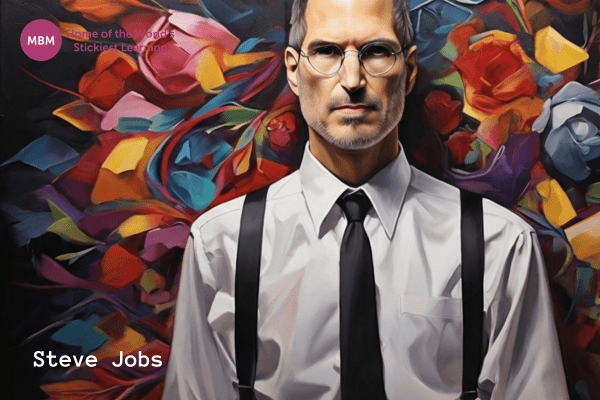
Transformative Impact on Apple’s Design and Innovation
Steve Jobs’ return to Apple in 1997 marked a turning point for the struggling company. Impressively, his visionary leadership transformed Apple into one of the most innovative players globally. Pioneering iconic products such as the iMac, iPod, iPhone, and iPad, Jobs redefined the tech industry. His focus on design extended beyond aesthetics, emphasising the fusion of functionality with aesthetic appeal. Aso, he demonstrated that design was not just about appearance but also about the user experience.
Cultivating a Culture of Creativity
At the core of Jobs’ leadership was the establishment of a creative culture at Apple. Acknowledging creativity as the catalyst for innovation, he fostered an environment where unconventional thinking and risk-taking were encouraged and embraced.
Jobs viewed failures as integral to the creative process, providing valuable lessons. Consequently, his transformational leadership inspired a team committed to ambitious goals. He set a high standard fueled by a passion for excellence and innovation.
As he aptly put it:
Innovation distinguishes between a leader and a follower.”
Comparison with Elon Musk Leadership
In the world of creative thinkers, Steve Jobs and Elon Musk stand out, each making a lasting impact in their industries. Steve Jobs, the design-focused pioneer, changed Apple by emphasising simplicity and innovation, while Elon Musk’s leadership style is revolutionising various sectors in a transformative way.
Simplicity as a Guiding Principle in Product Development
Steve Jobs was known for keeping things simple in product development. He thought that excellent products should be simple and easy to use. Famous for turning complicated technology into user-friendly devices, he focused on making the user experience a priority. Products were created with users in mind, having easy-to-understand interfaces that appealed to a wide audience. Jobs’ stress on simplicity not only boosted Apple’s reputation for innovation but also guaranteed that products were accessible and user-friendly.
Incorporating Steve Jobs’ Leadership Style
Leaders looking to encourage innovation and bring about transformative change can adopt Steve Jobs’ leadership style, which is marked by visionary thinking and a dedication to simplicity. To follow Jobs’ example, leaders should express a compelling vision that inspires and directs their teams toward a common goal.
Additionally, encouraging a culture of creativity involves providing the freedom for unconventional thinking, and viewing failures as valuable learning experiences. Furthermore, this style is well-suited for leaders aiming to revive struggling organisations or propel successful ones to new heights.
#7. Richard Branson: The Entrepreneurial Maverick
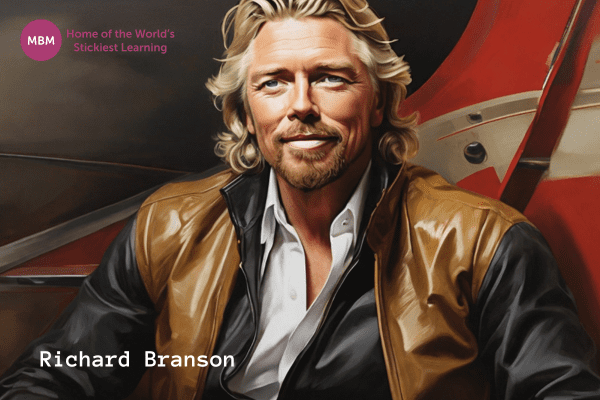
Leadership Across Industries
Richard Branson, a true entrepreneurial maverick, has showcased extraordinary leadership across diverse industries. From music and airlines to telecommunications and space tourism, Branson’s Virgin Group has left an indelible mark. His skill in shifting effortlessly between industries shows a distinct adaptability and a sharp understanding of market dynamics. Branson’s way of leading is marked by boldness, innovation, and an unwavering commitment to challenging the status quo.
Emphasis on Risk-Taking and Unconventional Approach
At the heart of Branson’s leadership philosophy is a profound emphasis on risk-taking. The Virgin Group’s unconventional approach to business has been a hallmark of Branson’s entrepreneurial journey. He also thrives on pushing boundaries, a trait that has defined Virgin’s ventures, making it synonymous with disruptive innovation.
Leadership Insights from Branson’s Entrepreneurial Journey
Richard Branson’s entrepreneurial journey offers valuable leadership insights. His ability to transform challenges into opportunities and view risks as catalysts for innovation stands out. Branson’s approach also emphasises the importance of being unafraid to venture into uncharted territories.
Comparison with Elon Musk Leadership
Furthermore, his hands-on way of leading serves as a guide for aspiring entrepreneurs. In the realm of visionary leadership, Elon Musk and Richard Branson are notable figures. They both guide their ventures with boldness and innovation. Elon Musk leads with a focus on technology disruption, while Branson, the entrepreneurial trailblazer, takes a unique path across different industries, displaying clear and effective leadership styles.
#8. Warren Buffett: The Sage Investor
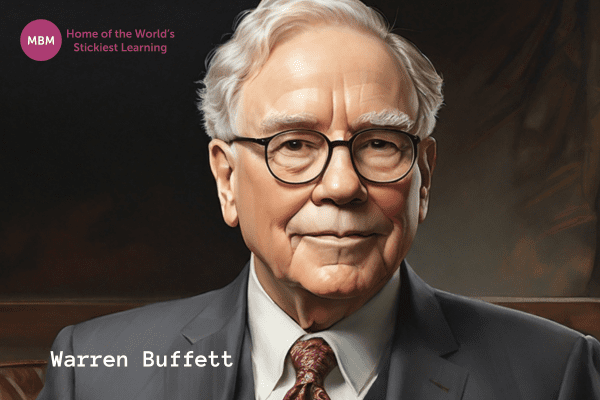
Investment Philosophy and Leadership at Berkshire Hathaway
Warren Buffett often hailed as the Sage Investor has built a legacy with his distinctive investment philosophy. As the leader of Berkshire Hathaway, he focuses on value investing and long-term wealth creation. Buffett’s leadership is characterised by a hands-on approach to investment decisions and a commitment to companies with enduring economic moats.
Long-Term Perspective and Decision-Making Principles
Buffett’s long-term perspective sets him apart. His investment decisions are rooted in a patient and disciplined approach, emphasising the important value of businesses. The Oracle of Omaha believes in investing in companies with sound fundamentals and enduring competitive advantages. His decision-making principles prioritise understanding the businesses he invests in and maintaining a margin of safety.
Leadership Lessons from Buffett’s Approach to Business and Finance
Warren Buffett’s leadership lessons extend beyond the realm of finance. All in all, his commitment to integrity, transparency, and humility serves as an inspiration. Buffett’s focus on continuous learning offers valuable insights for leaders navigating the complexities of business. His emphasis on ethical conduct remains a beacon for those aspiring to lead with wisdom and foresight.
Comparison with Elon Musk Leadership
In the world of finance, Warren Buffett stands as a sage investor, contrasting Elon Musk’s leadership. While Musk thrives on risk and innovation, Buffett’s approach at Berkshire Hathaway is characterised by a long-term perspective and prudent decision-making. Yet, both leaders, though in different fields, provide valuable insights into a diverse range of effective leadership styles, proving the varied paths to success.
Concluding Elon Musk’s Leadership Style and 7 Other Key Leaders
In looking at the leadership styles of figures like Elon Musk, Bill Gates, and Warren Buffett, a mosaic of leadership wisdom emerges. These forward-thinking leaders, each with distinctive approaches, have made a lasting impact on the world through innovation. From Musk’s daring vision to Gates’ charitable evolution to Buffett’s sage investment philosophy, each narrative provides a wealth of insights.




